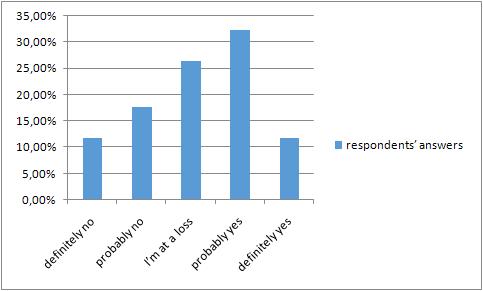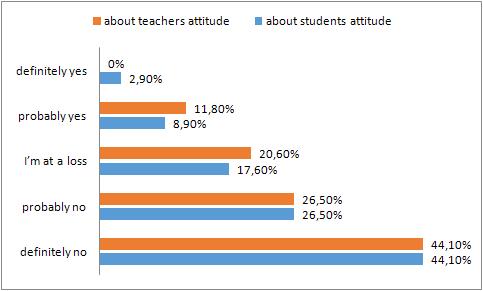Coming Together: Folk Songs Translation In Teaching Cross-Cultural Communication In Multinational Audience
Abstract
The article describes the project conducted with the students of the faculty of economics of the Kazan Federal University, during the English classes. The aim of the project was the activation of translation skills and the practice of translating folk songs from national languages to English, as well as acquaintance with the cultures of various nations, represented in the Kazan Federal University. The role of Kazan State University was emphasized, since approximately over 3,000 students from 80 countries study in the university at the moment. Within the frameworks of the project, we stressed the importance of multinational dialogue and the role of the English language being the language of multinational communication. With the aim of projects evaluation, students filled in special questionnaires at the beginning of the project and after its completion. The results were assessed with the help of methods of math statistics, which proved the statistical value of the conducted research. The results of the projects, gained after the project implementation, may arouse the interests of foreign languages teachers, sociologists, as well as the general public with interests in the sphere of international communication. In the future, it is planned to extend the project in the form of festival of nations with wide participation of student from different faculties.
Keywords: Cultural diversityintercultural dialoguefolk songEnglish languageproject activity
Introduction
Political and economic events in recent times stress the importance of reinforcing multinational dialogueues. The process of harmonization of cross-national relationship within the nation leads to strengthening of civil peace and consent in Russian society. By the same token, in the global arena, the peaceful coexistence and efficient social and economic development of all counties is possible only within the frameworks of international consent and tolerance. Under the term tolerance, one understands respect, acceptance and correct understanding of cultural diversity, variety of languages, cultural expressions and ways of human identity manifestation.
The researches of the problem analyzed the works dedicated to the issues of intercultural interaction and draw a conclusion that at the present time, we are facing the beginning of a new political culture, the culture of “tolerance – cooperation – integration”. By that, tolerance is regarded as a political and legislative prerequisite for peaceful co-existence in the multicultural society (Marinicheva, 2003, 159).
This prerequisite found its reflection in setting out the further direction of education in Russia. The Concept of Russian Education Modernization distinguishes, that “Educational Policy of Russia, reflecting the national interest in the field of education and demonstrating them to global society, takes into consideration the overall tendencies of global development, stipulating the necessity of significant changes in education system: i.e. the transfer to post-industrial informational society, considerable extension of cross-cultural cooperation; and more importantly, the factors of communication and tolerance” (Concept of modernization).
University education continues to strive for the refinement of tolerance in young specialists. Kazan Federal University being the constituent part of the multinational Republic of Tatarstan with its unique experience in the field of peaceful co-existence of various cultures is a place of meeting for the representatives of a vast range of cultures and nationalities. Last year, Kazan Federal University had 3,200 foreign students from 80 counties all over the world, among them Kazakhstan, Ukraine, Uzbekistan, Tajikistan, China, and others. Thus, the university boosts vast opportunities for the implementation of multicultural dialogues (KPFU Official Site). Multinational dialogue is a synonym of multinational communication. Multicultural dialogue is defined as the “communication between hosts of various cultures, who speak various languages (personal contacts between the people, more seldom in the form of indirect communication, such as writing, and mass communication)” (Savushkina, 2012, 87).
In our research, we seek to show that the task of studying the multinational communication can be successfully fulfilled at the lessons of foreign language. The choice of such a subject as foreign language is not a casual one. Foreign languages study is one of the subjects, that enables to raise a tolerant and multilingual individual, which is ready to communicate with representatives of other cultures. It is all because of the specific features of the subject, among them the formation of derivative language identity, a term which is defined as the personality, attached to the culture of the nation, which language is being studied. The term was introduced by the author of theory of language personality Karaulov (1993). Later on, Khaleeva (1980) introduced the linguistic-didactical interpretation of the term, which includes the formation of derivative language personality to be the basic aim of foreign languages studying. Another famous Russian linguist Galskova wrote that the traits of derivative language personality enable to enter inside the "soul" of the learned language, into the "flesh" of culture of the nation which is be second party of communication activities (Galskova, 2004, p.65). In this case, foreign languages learning obtains the character of the dialogue of cultures. As the result, interculturality is formed, which is a unity of educational means and studies about one’s home culture and foreign culture. Such interculturality comprises of 3 layers:
a) educational means of home culture needed for the foreign culture study;
b) new knowledge of foreign culture;
c) new knowledge about home culture obtained in the result of gaining new facts about foreign culture (Tarasov, 2012, p. 6).
Thus, every newly studied foreign language brings with it new knowledge for the learner, and also benefits the home culture. In the result of foreign languages studies, the society becomes polylingual, possessing its own cultural and ethnic identity, as well as knowledge about foreign cultures taken inside, estimated from the point of view personal opinions. Such personality owing to his knowledge about foreign cultures and traditions is not withdrawn to himself and his culture, and is much more tolerant to other nations. That was the reason why we decided that it is worth using the aspect of teaching tolerance and international communication at the foreign language lessons, and also within the framework of the present study.
Problem Statement
Before conducting the project, we identified the problem - the difficulties of social adaptation of young people in the context of global, social, and international tension. The teaching staff of the Kazan State University is widely aware of the existence of the problem, while they interact with the students of different nationalities, take notice of relationship between students, discuss the issues concerning with tolerance and cultural diversity during lessons. Cooperative education, scientific activities, and in particular, foreign languages study, encourage the removal of obstacles for the international communication, destroy cultural stereotypes, and promote friendship relations among nations.
Russian language is the basic language of study in Kazan Federal University, but Russian language done not always enable the accomplishing of all the goals of communication between the students and teachers. The reasons for that may be the poor knowledge of Russian language by some groups of students, uneasiness using Russian language because of their foreign accent or language barrier. In contrast to Russian language, English language is foreign for a vast majority of student, that is why the mistakes or accent do not affect the perception of the speaker by the listeners as opposed to Russian language, when the speaker with a foreign accent can be prejudged. That is why English language plays a uniting role, because in terms of speaking English language all are equal - the representatives of the titular nation and other students.
Research Questions
Before conducting the research, we identified the questions, that we wanted to investigate, those are if students of the economic faculty notice any examples of the intolerance in the university, whether it is possible to teach intercultural communication and tolerance with the help of folk songs translation, and whether the students would like such an activity and find it useful.
Purpose of the Study
Taking into account this peculiarity, we defined the purpose of the project, that is, with the help of the English language we can show the students the wealth of national cultures, promote the dialogue of cultures, prove the status of English language as the universal language in global communication, increase the motivation of the students for English language learning
Research Methods
To achieve this aim, the methods of project activity and survey were used. The project implied the translation of folk or popular song from the mother tongue into English (in prosaic form under the teacher’s control) and its presentation to groupmates with commentary on area features, historical reference and translation decisions. As folk songs are representations of national wisdom and cultural heritage, the project helps to create a positive image of a nation in students’ minds, an image that is deprived of any political colouring – the thing that is essentially important in our times of global social and international tension
Findings
In order to fulfil the project, we conducted a survey. The students’ task was to rate the intensity of the phenomena given below on a five-point scale (1 – definitely no, 2 – probably no, 3 - I’m at a loss, 4 – probably yes, 5 – definitely yes):
I have some specific attitude towards representatives of some nations.
I notice some specific attitude of professors towards non-indigenous students.
I notice some specific attitude of students towards non-indigenous students.
I am interested in other nations’ cultures.
I think that folk songs are the reflection of wisdom and cultural heritage of the nation.
I think that the English language as the language of global communication, can be used as a mediator in building international cultural dialogue.
Also, a question with open answer was offered:
In your opinion, what can contribute to a decline of international tension in society?
34 respondents took part in a survey (19 as presenters and 15 as viewers). Having analyzed the results of that preliminary survey we came to the following conclusions (It is to be noted that all respondents answered all the questions successfully:
1-3. The first three questions were dedicated to the main problems identified at the preliminary stage of the project, i.e. whether there are difficulties concerned with the social adaptation of young people of different nations under the conditions of global, social, and cross-ethnic tension. Almost half of the students (44,1%) have some stereotypes about other nations’ representatives though they are blurred – 32.3% of respondents answered, “probably yes” and only 11,8% - “definitely yes”. 29.5% claim about full (11.8%) or partial (17.7%) absence of national stereotypes.

Students showed complete agreement in evaluation of students’ and professors’ attitude to non-indigenous students –70,6% are sure that both students and professors treat indigenous and non-indigenous students in the same way, the figure can be a proof of an objective assessment of the situation. Still 11,8% of respondents feel that there is some specific attitude towards non-indigenous students (2,9% - “definitely yes”, 8,9% - “probably yes”). 17,6% and 20,6% of respondents were at a loss (on students’ and professors’ attitude respectively).

4. More than a half of students (55.9%) have deep or moderate interest to other nations’ cultures, 26.5% confessed either to full lack of interest or to poor interests.

5. Majority of respondents (79,4%: 52,9% - “definitely yes”, 26,5% - “probably yes”) assume that folk songs are the reflection of wisdom and cultural heritage of a nation.
6. Almost all the students (88,2%: 67,6% “definitely yes”, 20,6% “probably yes”) believe that English language as the language of global communication, can be used as a mediator in building international cultural dialogue. The rest are at a loss. The fact that no one chose variants “probably no” or “definitely no” proves that the English language is of high status in the minds of students.
7. The students suggested many ways of solving the problem of international tension giving answers to the last question of the preliminary questionnaire. They demonstrated well-formed civil consciousness and high-level tolerance by pointing at the necessity of forming the understanding that “all of us are human” (including the religious aspect – “for God we all are equal”). Furthermore, they recommended nurturing tolerance and raising the level of upbringing in general (“the main thing is that representatives of all the nations demonstrate their level of culture and politeness so that no one could think badly of them”). Also, they made an accent on the importance of development of international cooperation and mutual help. The students guess that organizing different events, celebrations, games etc. can be really helpful. Among the answers given, the positive role of globalization was stated with all the phenomena inherent to it (international marriages, for example) as one way of solving the problem. Twice, the radical method of deportation was mentioned.
Overall, students translated 15 songs from Russian, Tatar, Bashkir, Kazakh, Ukrainian, Arabic. Students took both folk and popular (precedent) songs for translation. On popular songs – though they are author’s ones, the songs chosen were loved by the people, so they can easily be defined as folk songs. Many songs were related to the Great Patriotic War. Also let us note that often students preferred modern versions of folk songs sung by popular youth singers.
After the projects’ demonstration, we conducted the second survey where the first six questions were the same for presenters and viewers:
I got assured that folk songs are the reflection of wisdom and cultural heritage of the nation.
After viewing the projects of my groupmates, I understood that all nations share the same set of values – love, friendship, respect to elder people etc.
After the projects demonstration, I felt interested in the culture of other nations.
In my opinion, such events contribute to the formation of tolerance and elimination of stereotypes.
Should such events take place in the university?
I fully realized the role of English as the language-mediator.
Through the process of translation, I (with the help of my teacher or without it) understood some grammar aspects.
Through the process of translation, I learned new words.
I got skills on correct sentence building
I got very useful translation skills.
Also, it is worth noting that 3 questions of the preliminary stage of the project coincide with 3 questions of the concluding stage. In order to analyze the findings, we used the methods of mathematical statistics with the aim to identify whether the project activity changed the attitude to folk songs as culture examples. For analysis, we used the Students t-test criteria, and the results showed that change of attitudes towards folk songs were statistically significant.
The results were the following:
I got assured that folk songs are the reflection of wisdom and cultural heritage of the nation.
The share of those who agree with the statement rose up to 94,1% (82,3% gave answer “definitely yes”, 11,8% - “probably yes”).

-
After viewing the projects of my groupmates, I understood that all nations share the same set of values – love, friendship, respect to elder people etc.
85,3% - “definitely yes”, 14,7% - “probably yes” – the results say that the main aim of the project is achieved
After the projects demonstration, I felt interested in the culture of other nations.
There are also positive results - 79,4% of respondents proclaim their deep or moderate interest to culture of other nations compared with 55,9% before the project demonstration.

-
In my opinion, such events contribute to the formation of tolerance and removal of stereotypes.
All students this or that way agree with the statement (one was at a loss)
Should such events take place in the university?
64,7% choose variant “definitely yes”, 26,5% “probably yes”.
I fully realized the role of English as the language-mediator
There is a rise in the significance of English language in students’ minds. 79,4% of respondents completely agree with the statement while 17,6% agree partially.
![[Comparison of the answers to the question “I think that the English language as the language of global communication, can be used as a mediator in building international cultural dialogue” before and after the project].](https://www.europeanproceedings.com/files/data/article/70/2300/IFTE2017FA063F.fig.006.jpg)
The project was useful both for tolerance formation and for English language learning. There were several additional questions for active participants of the project.
Through the process of translation, I (with the help of my teacher or without it) have understood some grammar aspects.
89,5% of the students translating songs from their mother tongue into English fully did it.
Through the process of translation, I have learnt new words.
Increasing vocabulary through translation was not so successful: 63,2% noticed their absolute or relative progress. It might be that the reason of such considerable gap between grammar and lexical skills development is the specifics of the songs’ text (many folk songs contain numerous repetitions that are typical for this genre) and individual characteristics of the participants).
I got skills on correct sentence building.
Positive or probably positive result is noted by 73,7% of respondents. From our point of view, the participants of the project got even more than an additional opportunity to train their sentence building skills but also got understanding in poetic syntax and its peculiarities.
I got very useful translation skills
All project participants believe that the process of translation a song from their native language into English contributed to the development of their translation skills - 78,9% fully agree with it, 21,1% are inclined to think so. It should be noted that all the students asked their teacher for help, since some figures of speech that are characteristic for folk songs are lacunas, so they had to make different transformation – grammatical, lexical, stylistic etc. The situation was difficult in cases the teacher didn’t know the native language of his/her student (Arabic, for examples). In this case, the student had to explain the specifics of a grammar aspect or lexical unit in order to find the best translation solution. The main problem that students translating songs from Russian into English faced with is the passing the shades of meaning that are expressed by diminutive suffixes («полюшко» etc.) and repetition («волявольная»). Sometimes students were not careful enough in word choice in their translation drafts – not all of them worked properly with dictionary articles. Some students chow the first variant of translation offered without any link to the context. After checking the translation draft, teachers had to explain the difference in the usage of words. Students demonstrated complete understanding of proper consulting with the dictionary.
Conclusion
The data obtained allows making a conclusion that the presentation of projects demonstrated the efficiency of this method in acquaintance of students with other nations’ cultures, raising the level of tolerance and motivation to English language learning. During the implementation of the project, a number of faults were discovered, connected mostly with misconception of the task by the students, so for future reference, the task should be described in details and an example can also be given. An annual organization of the Festival of International Friendship “Let’s come together” is being planned. The inclusion of some tolerance-forming projects is being examined – besides presentation of songs with area like; historical and cultural notes, folk dances, performances, workshops on craftsmanship, etc.
Acknowledgments
The work is performed according to the Russian Government Program of Competitive Growth of Kazan Federal University.
References
- Galskova N.D, Gez N.I. (2004). Theory of Foreign Languages Teaching: Linguistic didactic and methodic, 336.
- Karaulov, Yu.N. (1993). Associativnaya grammatika russkogo yazika. Izdatelstvo: Russkij Yazik, 336 p.
- Khaleeva, I.I. (1980). Osnovy teorii obucheniya ponimaniyu inoyazychnoj rechi. Voennyj krasnoznam. institute. – M.
- Marinicheva, A. V. (2003). International communication and formation of tolerant linguistic personality. Integration of education, № 3, 158-160.
- Order of the Ministry of Education of the Russian Federation from 11-02-2002 393 On the concept of modernization of Russian education for the period until 2010 (2017) Actual in 2017.
- The number of foreign students in KFU will rise to 4000 people [Electronic resource] URL: http://kpfu.ru/news/kolichestvo-inostrannyh-studentov-v-kfu-dostignet.html (date of access: 19.04.2017).
- Savushkina, L. V. (2012). Intercultural communication as a subject of research in the modern education system. Integration of education, № 4 (69), 87-91 1
- Tarasov E.F. (2012). Intercultural cooperation – new ontology of language consciousness study, 6-7
Copyright information

This work is licensed under a Creative Commons Attribution-NonCommercial-NoDerivatives 4.0 International License.
About this article
Publication Date
31 August 2017
Article Doi
eBook ISBN
978-1-80296-028-0
Publisher
Future Academy
Volume
29
Print ISBN (optional)
-
Edition Number
1st Edition
Pages
1-960
Subjects
Teacher, teacher training, teaching skills, teaching techniques
Cite this article as:
Mordvinova, A. R., & Gololobova, N. I. (2017). Coming Together: Folk Songs Translation In Teaching Cross-Cultural Communication In Multinational Audience. In R. Valeeva (Ed.), Teacher Education - IFTE 2017, vol 29. European Proceedings of Social and Behavioural Sciences (pp. 544-553). Future Academy. https://doi.org/10.15405/epsbs.2017.08.02.63

